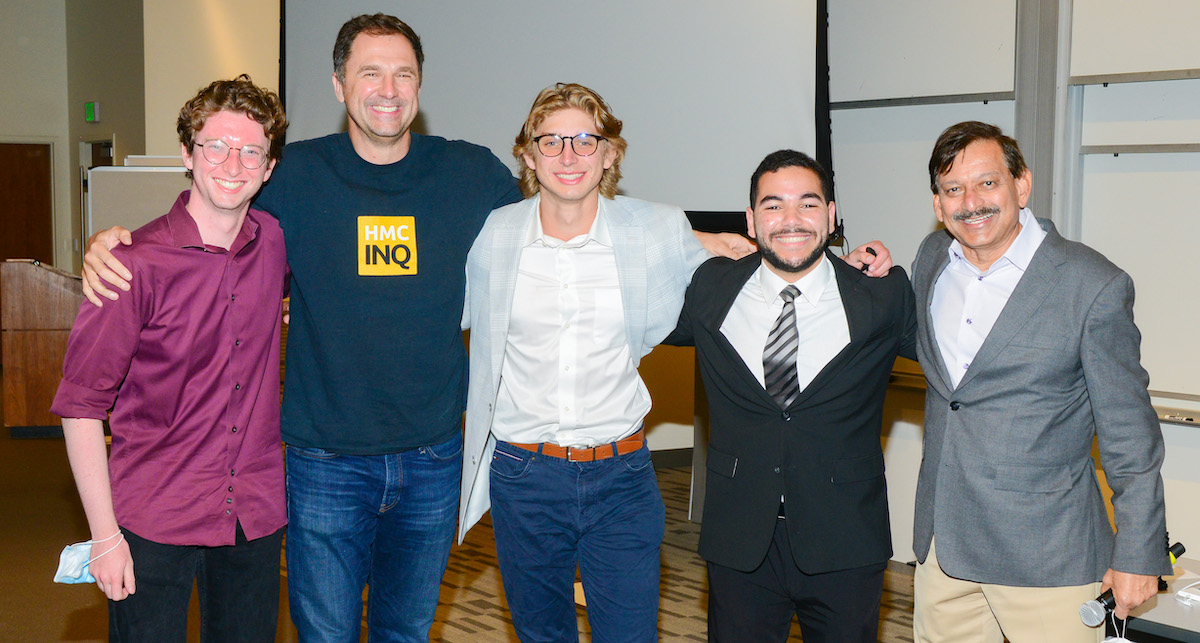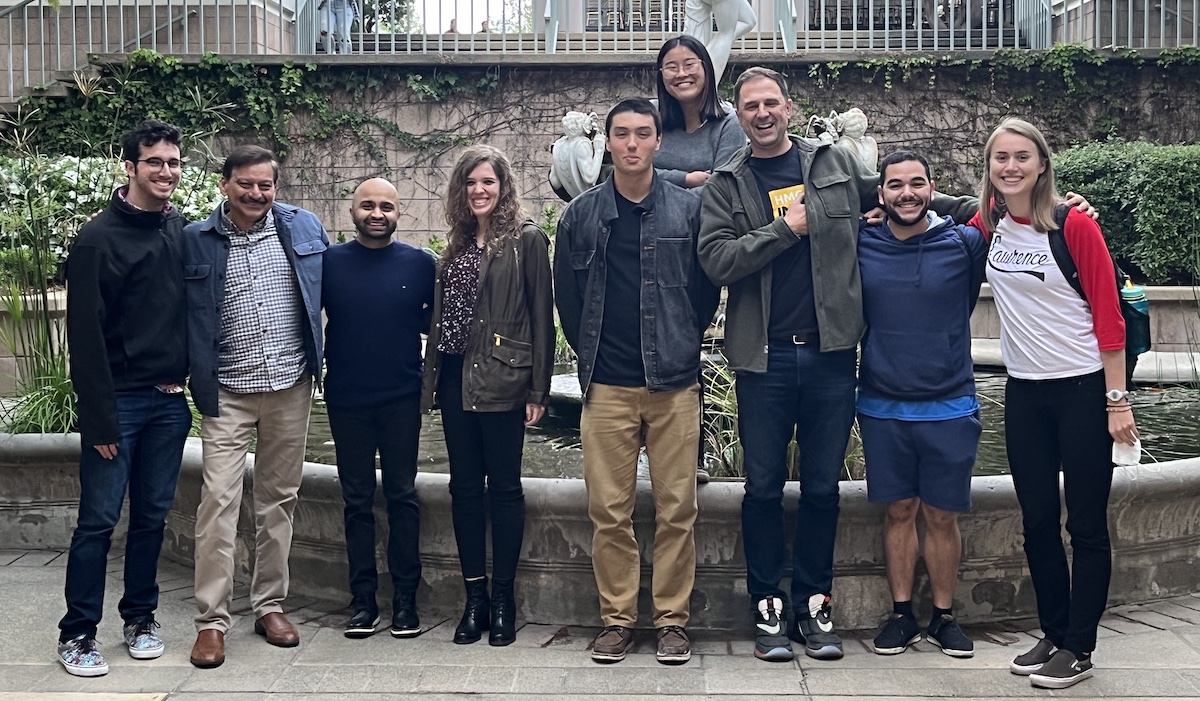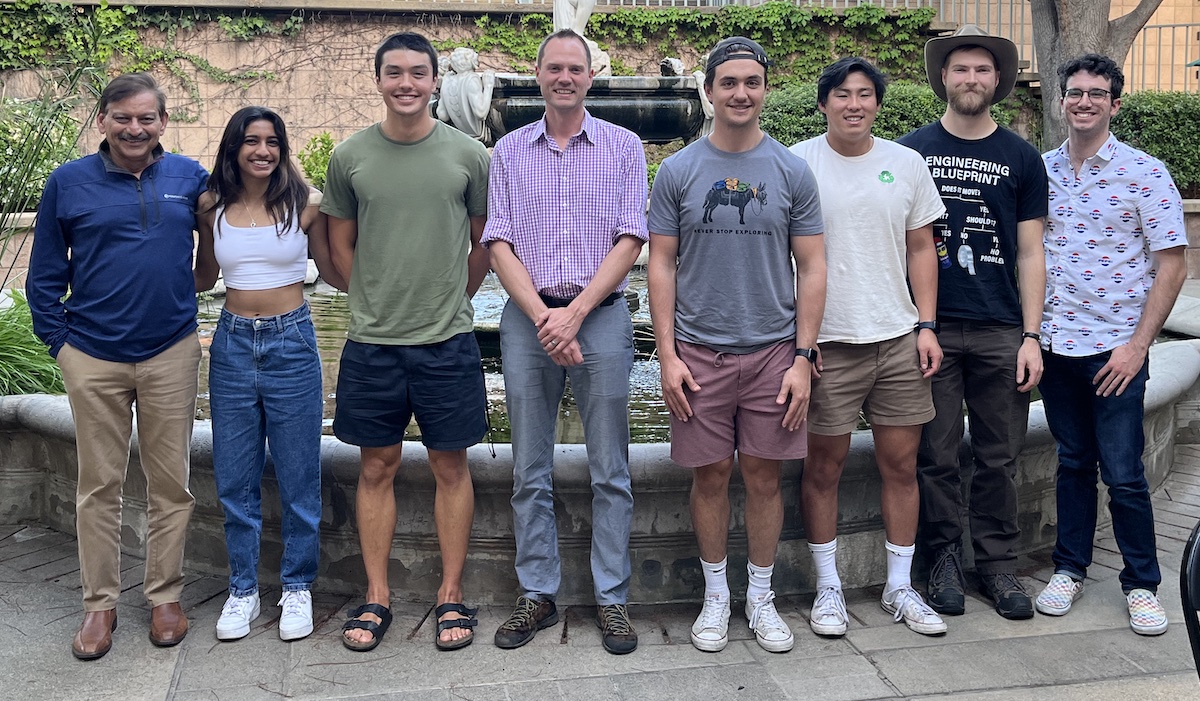HMC Entrepreneurship Class Produces First Startups
May 12, 2022
Ten student teams pitched startup ideas to venture capitalists/judges at the conclusion of Harvey Mudd College’s spring 2022 Entrepreneurship class, and two teams—Athena, a modern class registration app to help students graduate, and Terra Robotics, a direct air capture product—won the chance to pitch their concepts to well-known venture capitalists this summer.
The new class, led by HMC engineering professor and the director of entrepreneurship initiatives Kash Gokli, had an enrollment of 63 students from each of the undergraduate Claremont Colleges and CGU (73% from HMC). One of the class sessions was about “How to Find a Co-founder.”
“It was fascinating to see the students reaching out across the colleges to find co-founders for their companies,” says Gokli. “I saw cross-college teams with members from HMC, CMC and Pomona leveraging students’ strengths from other colleges.”
The course is part of HMC’s effort to strengthen and expand its curricular and co-curricular activities to nurture the next generation of entrepreneurs. In addition to HMC alumni entrepreneurs and others who shared their success stories and covered topics of interest during class sessions, the 10 teams came up with startup ideas and worked on them throughout the semester. Projects included apps for more efficient road trips, to convert freeways into free markets, to decentralize art and to streamline the giving process. Student teams also pitched ways to connect makers with consumers and to help schools provide better instruction for complex 3D concepts.
Mentors included Josh Jones ’98, DreamHost co-founder and co-founder of the startup incubator HMC INQ, and HMC trustees Sergio Monsalve P25 and Mar Herschenson P24.
“I was blown away by the level of student energy, the quality and the breadth of projects students worked on,” says Herschenson. “This class is an important step to inspire our students to become great entrepreneurs.”
“It was very encouraging to see students’ interest in entrepreneurship,” says Gokli. The class is aimed at those who would like to launch a startup upon graduation or later, students who want to join established companies and apply their entrepreneurial skills and spirit and students who would like to be social entrepreneurs. “Entrepreneurial skills and an entrepreneurial spirit can benefit students in all career paths.”
The winning teams—Athena led by Ayman Abdellatif ’24 and Terra Robotics led by Ryan O’Hara ’24—will pitch to well-known venture capitalists in northern and southern California this summer.
Athena

Ayman Abdellatif ’24 describes Athena as modern class registration to help students graduate. According to his research, 50% of four-year college students and 80% of two-year college students don’t graduate due to finances, academic disqualification, poor socialization and other factors. With a focus on course preparation, student connection, on-demand tutoring and local community engagement, the Athena service would require colleges to pay a subscription per student. Along with Abdellatif, who is CEO of Athena, Ammar Fakih ’24 is CTO, Lucas Welsh CMC ’25 is CMO and Andrew Faber ’24 (UC Riverside) is senior software developer.
“Ammar Fakih and I were talking about wanting to do something meaningful during our time at Harvey Mudd,” says Abdellatif. “I had been in ID049 for a couple weeks and decided that over our short time at Mudd, Ammar and I had enough experience to at least dabble in the tech industry. Ammar had wanted to develop a resource like Hyper-schedule that expanded on the idea of scheduling courses effectively. At the same time, I had also been brainstorming an app I like to call FlashPolitics that allows citizens to see short, yet educational, bullet points on elected topics to inform people of their options. Putting these ideas together we created Class Pages, which is currently a key feature of Athena. Class Pages allows for students to get more information such as: course syllabi, hours spent on a course outside of class, and even course recommendations about all their possible courses in an organized mobile app.”
Abdellatif says the class has inspired him to become an entrepreneur. “After listening to all the guest speakers and meeting with them at the pre-class dinners, I began to see my dream of being a CEO develop. These awesome alumni showed me how it’s possible to chase that dream, even at a young age. Moreover, the guidance of Professor Kash Gokli, Josh Jones, and Mar Hershenson allowed me to get this far with my team. Having successful people who believe in my team and our dream has been a key aspect in our progress.”
Terra Robotics

Citing rising sea levels, increasing temperatures and climate-fueled conflict as issues that affect everyone, Terra Robotics founder Ryan O’Hara ’24 sees direct air capture as a solution that benefits everyone. DAC technology pulls CO2—the primary greenhouse gas driving climate change—from the air and sequesters it away beneath the Earth so it can no longer warm our planet. The Terra Robotics product is a DAC robot that floats on the ocean and uses hydropower and biochar to sequester carbon dioxide. O’Hara says it is sustainable, cheap to produce, produces net negative carbon emissions and aligns with cutting-edge DAC science. Terra Robotics would target 154 coastal governments around the world.
O’Hara, a sophomore transfer student double majoring in environmental robotics (IPS) and math/CS, has considerable experience in the climate science community. He worked at NASA in 2020 on the development of a water purification system that could mitigate the effects of future droughts; in 2021, he took a research expedition on the Atlantic to study the impacts of climate change on marine ecosystems, and he worked with the United Nations on recent climate assessment reports to study the ways the climate crisis is projected to impact human civilization.
“All of this has shown me firsthand how severe and serious climate change is and will become in the coming decades, and I started my company with the hope that I could use the skills I’ve developed to make a difference in the fight against the climate crisis,” O’Hara says. “The class gave me the push to put something into action I’ve been thinking about for a few years now: using science to make the world a better place and help those who’ll be most impacted by climate change. I also got a lot out of the guidance provided by both the guest speakers and Mar Herschenson, founder of a venture capitalist firm and one of our guest speakers, who gave me valuable advice on how to move my idea from theory to reality.”
This summer, along with team members and engineering majors Devon Overbey ’24 and James Barrett ’24, O’Hara will begin prototype design. Within the next year or two, they hope to have a prototype that achieves the desired parameters so they can begin to scale up. “Five years from now, we hope to have a significant number of units deployed in the ocean.”
Visit the Entrepreneurship site for more information.
